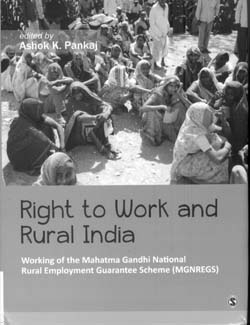The title of the book in discussion is indicative of the foundational tenet of the volume. The point of departure is to accept ‘right to work’ fundamentally as an issue of justice with reference to the rural communities of India. The context of analysing such a contact between justice and communities is the Mahatma Gandhi National Rural Employment Guarantee Act 2005 (MGNREGA) and its application through Mahatma Gandhi National Rural Employment Guarantee Scheme (MGNREGS). In other words, the issue of justice (the right to work) has been evaluated in the broader philosophical premise of institutional model and policy level interventions with the state, target groups and civil society organizations (CSO) as various stakeholders. This immediately brings forth another issue of ensuing tension that such a demand for justice must entail in a neo-liberal Indian economy. The assessment of MGNREGS in this volume is thus contextualized within the pattern of changes that the Indian economy has experienced and is experiencing before and after the implementation of MGNREGS since February, 2006. The discussion is contained within five sections including a fairly lengthy introduction by the editor. The contributors are from the field of economics and social, economic policy giving the book a particular academic approach in the assessment of the working of MGNREGS. It is, however, also enriched by insights from grass-root level experiences, political scientists and sociologists (Ambasta 2012; Raabe et al 2012; Singh, Joshi & Joshi 2012).

Employment Strategy for Poverty Alleviation
Anubhav Sengupta
RIGHT TO WORK AND RURAL INDIA: WORKING OF THE MAHATMA GANDHI NATIONAL RURAL EMPLOYMENT GUARANTEE SCHEME (MGNREGS) by Ashok K. Pankaj Sage, New Delhi, 2013, 381 pp., 1195
May 2013, volume 37, No 5
